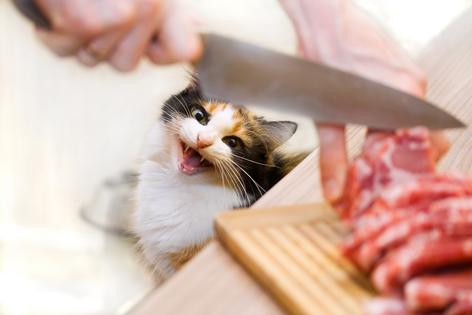My Pet World: Cat’s early morning yowling for food is difficult for pet parents
Dear Cathy,
Our cat, Jack, is 19-1/2 years old. We've had him since he was a kitten. He's a mixed breed, but has Siamese markings and has always been talkative. Now he's old, deaf, and arthritic. Otherwise, he's healthy and gets good marks at his annual checkup.
Ordinarily, he gets wet cat food twice a day — at 4:30 a.m. and again at 5:30 p.m. He also has a gravity feeder with high-quality dry cat food. But he currently has no sense of time and is waking us at 3 a.m. to eat — and he will keep howling until we give in.
If we feed him, he'll eventually go back to sleep. We tried giving him his afternoon snack late in the evening, and that worked for a while. But now we're back to the old routine, and I'm just about at my wit's end. It's incredible how loud he is, very repetitive in rhythm and pitch; and it's like fingernails on a chalkboard.
I now understand why people surrender their pets to shelters. I don't want to put down a cat who's healthy for his age, but I don't know how much more of this I can take. When you have a newborn baby and multiple nighttime feedings, you have some comfort in knowing the baby will eventually sleep through the night. Is there anything we can do?
— Kathy, Lincoln, Nebraska
Dear Kathy,
Aging can bring about changes in behavior that can be addressed, so please don’t surrender your otherwise healthy cat to a shelter. Behaviors and health problems can always be addressed.
Jack also may have developed a health problem, like a thyroid issue, which can cause increased hunger, restlessness, and vocalizations. This would not pop up during his annual checkup unless you’re getting blood tests at the same time. So, please take him to the vet to rule out an underlying health issue first.
If there are no underlying health issues, there are a few things you can try to alleviate his nighttime restlessness. First, play with him three times a day for about as long as he will tolerate at his age, including once before bedtime.
Then give him a feline calming chew (available over the counter) and feed him his early morning wet food before bedtime to mimic a cat’s natural nocturnal feeding habits.
A full tummy and a calming chew may help him rest better. During the day, provide him with lots of mental stimulation, such as interactive toys or puzzle feeders, to prevent boredom. Move his other wet food feeding to mid-morning or early afternoon.
If nighttime restlessness persists, talk to your vet about prescription options.
Dear Cathy,
How do you feel about the vet cleaning our Havanese’s teeth? I took him in for grooming, and they said his teeth needed to be cleaned. They said their prices start at $500. I bought some teeth-cleaning chews instead, but he won't chew them. Do I really need to pay $500 for a cleaning, or should I let it go? The dog is just over three years old.
— Jim, Schererville, Indiana
Dear Jim,
Your dog is still very young, so I would not let it go. Dental disease can cause a lot of other health issues that can shorten your dog’s life. Sadly, it’s common these days for dogs as young as three years old to show early signs of dental disease.
Fortunately, various preventive measures are available, such as dental chews, wipes, water additives, and other products designed specifically for maintaining dental hygiene in pets.
However, if your dog's teeth are already in poor condition, simply adding preventive measures to his routine may not suffice. Once professionally cleaned, it's easier to make brushing and other preventative measures routine, which will reduce the need for professional cleanings in the future.
Brushing your dog's teeth two to three times a week, or better yet, daily, is easy to do. To get started, get a dog-specific toothbrush and flavored toothpaste formulated for dogs, which is safe to swallow.
Put a small dot of toothpaste on the brush and let him sniff and lick it, so he becomes familiar with the flavor. When you're ready to begin brushing, lift your dog's lips and gently brush their teeth using a circular motion, focusing on the outer surfaces where plaque and tartar accumulate. If your dog becomes anxious or resistant, pause and try again later. Reward your dog after each session with praise and crunchy treats.
Consistency is vital. A professional teeth cleaning and regular dental checkups with your veterinarian will help monitor your dog's oral health and address issues early on.
========
(Cathy M. Rosenthal is a longtime animal advocate, author, columnist and pet expert who has more than 25 years in the animal welfare field. Send your pet questions, stories and tips to cathy@petpundit.com. Please include your name, city, and state. You can follow her @cathymrosenthal.)
©2024 Tribune Content Agency, LLC.
(c) 2024 DISTRIBUTED BY TRIBUNE MEDIA SERVICES, INC.












Comments